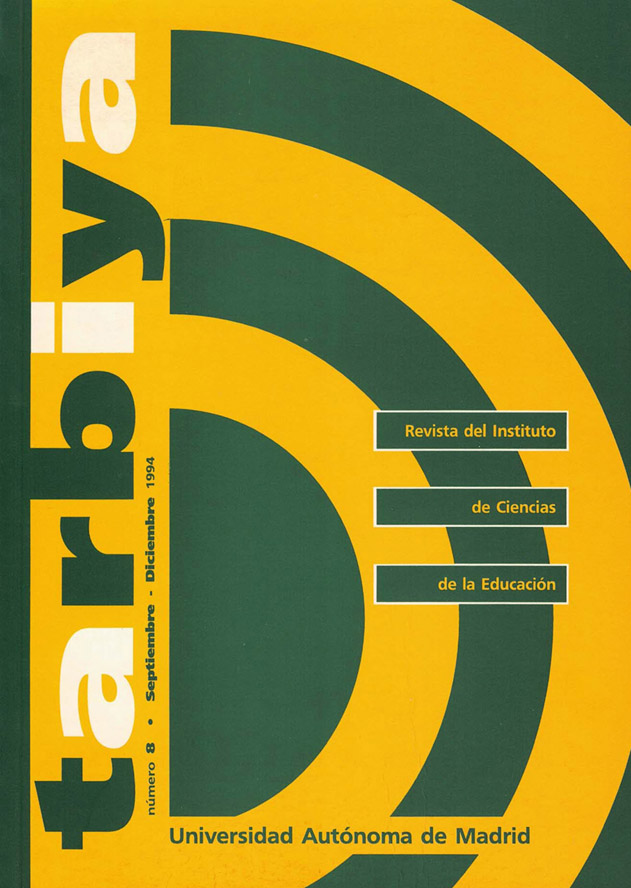Abstract
This essay intends to analize some ideological aspects of the Educative Reform which have not been pointed out sufficiently yet. It begins with the recognition of everything positive that the Reform brings forward, but it wants to point out some of its possible weaknesses.
After going through the educative patterns which the Spanish society has lived for the last half century or so (the "banking" and the "technopedagogical"), the essay centres on the analysis of the pattern which the Reform defends, called psycopedagogical. From this on the following points are infered: 1) It is a pedagogical system centred on the student individualized experience and on his private "interests" (individualized teaching, inclined to the protagonism of "how" to teach); 2) Its patterm of teacher is what is called psychopedagogue (motivator and tutor); its pedagogical method centres on "inductivist techniques" appropiate to generate a kind of teaching as a student personal discovery.
The critical valuation of the pattern concludes that such an educative system implies: 1) a pejorative valuation of culture; 2) a reduction of teachers a simple "pedagogical supervisors"; 3) an erratic conception of the educative process in so far as it turns "procedures" into nucleus of the process itself just inclining towards the "pedagogical formalism"; 4) an inductivist conception of teaching, superficial and mistaken; 5) and even it wonders about the possible abuse which constructivism might have committed in becoming the ideological implement of the State to the Educative Reform. The essay comes to an end considering the individualist conception of man that the capitalist system hides which is reflected in the background ideology of the Reform.
Downloads
References
ÁLVAREZ, A. (Comp.) (1987): Psicología y Educación. Madrid: Visor.
AUSUBEL, D.P. (1983): Psicología Educativa. México: Trillas.
BARRÓN RUIZ, A. (1991): Constructivismo y Desarrollo de Aprendizajes Significativos. Revista de Educación. 294.
COLL, C. (1990): Los Ejes de la Reforma. Cuadernos de Pedagogía, 185.
COLL, C. (1991): Psicología y Currículum. Barcelona: Paidos.
Id. (Comp.) (1981): Psicología Genética y Educación. Barcelona: Oikos-Tau.
CUADERNOS DE PEDAGOGÍA (1989): Enseñar a Aprender. 175.
CUADERNOS OE PEDAGOGÍA (l993): El Profesorado. 220.
DELVAL, J. (Comp.) (1979): Lecturas de Psicología del Niño. 2 vol. Madrid: Alianza.
DELVAL, J. (1991): Los fines de la Educación. Madrid: S. XXI.
DELVAL, J. (199l): Reforma Educativa y progreso social. Tarbiya, 1-2 , 7-18.
FERNÁNDEZ DE CASTRO, I. (1975): Reforma Educativa y Desarrollo Capitalista. Madrid: Edicusa.
FREINET. C. (1970): Parábolas para una Pedagogía Popular (Los Dichos de Mateo). Barcelona: Estela.
FREINET, C. (1972): Por una Escuela del Pueblo. Barcelona: Fontanella.
FREIRE, P. (1972): La Educación como Práctica de la libertad. Buenos Aires: Siglo XXI.
FREIRE. P. (1975): Pedagogía del Oprimido. México: S. XXI.
GARCIA MADRUGA, J.A. (1991): Desarrollo y Conocimiento. Madrid: S. XXI.
GIMENO SACRISTÁN, J. (1991): El Curriculum, una Reflexión sobre la Práctica. Madrid: Morata.
GIMENO SACRISTÁN, J. (1992): Comprender y Transformar In Enseñanza. Madrid: Morata.
GIMENO SACRISTÁN, J. (1992): Reformas educativas, Utopía, Retórica y Práctica. Cuadernos de pedagogía, 209.
GIMENO SACRISTÁN, J. (1994): "Entrevista". Cuadernos de Pedagogía, 221.
GIMENO SACRISTÁN, J. y PEREZ GÓMEZ, A. (1987): El Pensamiento Pedagógico de los Profesores. Madrid: CIDE.
GÓMEZ-GRANELL., C. y COLL SALVADOR. C. (1994): De qué hablamos cuando hablamos de constructivismo. Cuadernos de Pedagogía. 221.
JIMÉNEZ JAÉN, M. (1993): Reforma educativa y profesionalización docente. Cuadernos de Pedagogía, 220.
MACPHERSON (1979): La teoría política del individualismo posesivo. Barcelona: Fontanella.
MARCHESI, A., CARRETERO, M. y PALACIOS. J. (Comp.) (1985): Psicología Evolutiva. Vol. l. Teoría y Métodos. Madrid: Alianza.
M.E.C. (1989): Diseño Curricular Base. Educación Secundaria Obligatoria. 2 vol. Madrid: M.E.C.
M.E.C. (1991): Bachillerato, Estructura y Contenidos. Madrid.
ORTEGA, F. (1992): Las ideologías de la Reforma Educativa. Revista de Educación, Extra.
PIAGET, J. (1971): Psicología y Pedagogía. Barcelona: Ariel.
POZO MUNICIO, J.I. (1989): Teorías Cognitivas del Aprendizaje. Madrid: Morata.
POZO J.I. y CARRETERO, M. (1986): Desarrollo Cognitivo y Aprendizaje Escolar. Cuadernos de Pedagogía. 133.
REVISTA DE EDUCACIÓN (1988): Monográfico sobre Innovación Educativa. 286.
REVISTA DE EDUACIÓN (1992): La L.G.E., Veinte Años Después. Nº Extra.
STODOLSKY, S. (1991): La Importancia de los Contenidos en la Enseñanza. Barcelona: Paidos.
TARBIYA: Nº 1-2, Jul.-Nov. 1992.
VALDEÓN, J. (1992): Los problemas de la enseñanza de la Historia en España. Tarbiya, 1-2, 67-79.
VEGA, M. (1984): Introducción a la Psicología Cognitiva. Madrid: Alianza.
VIGOTSKI, S.L. (1979): El Desarrollo de los Procesos Psicológicos Superiores. Barcelona: Crítica.

